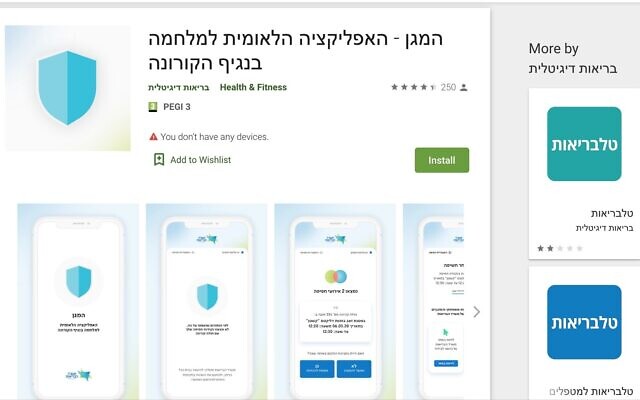Health Ministry launches phone app to help prevent spread of coronavirus
‘Hamagen’ tracks a user’s whereabouts and then compares them to known movements of those diagnosed with COVID-19, to check if paths crossed within previous 14 days
Stuart Winer is a breaking news editor at The Times of Israel.

The Health Ministry announced Sunday the launch of a new smartphone app to help to prevent the spread of the deadly coronavirus — by enabling users to know if they crossed paths with someone who has been diagnosed with the virus.
It came as infections topped 1,000 in Israel, where the key strategy in defeating the outbreak of the virus has been to isolate those who are already infected, and those that may have been exposed to the pathogen.
Called Hamagen (The Shield), the app reveals if a user was, over the previous 14 days, in close proximity to anyone who has been diagnosed with the virus, the ministry said in a statement.
“The application is a technological means intended to give each and every one of us the ability to accurately and immediately know if we were in contact with a person who was infected with the coronavirus,” the statement said. “With this we can stop the spread of the disease and protect those closest to us.”
Previously, the ministry has published the epidemiological history of COVID-19 patients, listing all the places they have been and advising those who were at any of the locations at the same time to self-quarantine for 14 days. However, as the number of cases diagnosed each day leaped into dozens and then hundreds it rapidly became impractical for the public to review all the listings.
After a user installs the app, it keeps track of their movements and compares the information with Health Ministry data on where those who are positively diagnosed have been. If the app finds a match — that the user was in the same area at the same time — it links the smartphone’s owner to the Health Ministry website for information on what to do next, and how to register as going into self-quarantine.
The ministry stressed that all the information on the user’s movements is only stored on the smartphone, which is kept updated by the ministry with the epidemiological data of known COVID-19 cases.
“The Health Ministry data is updated all the time and are sent to your phone unilaterally for the purpose of cross-reference,” the statement said.
The app was developed in Israel for the ministry using “open source code and the values of mutual responsibility.”
“Only together can we beat the coronavirus,” the ministry said.
The app comes alongside a controversial measure approved last week by the government using emergency powers which allows the Shin Bet security agency to track the movements of all smartphones users via their devices and then automatically sends alert messages to those who may have been exposed to the virus by coming close to a COVID-19 patient.
The Shin Bet surveillance program, approved for 30 days, has been attacked as an infringement on civil rights.
Hamagen is available for Android phones on Google Play, and iPhone at the App Store.

As of Sunday evening there were 1,071 confirmed cases of COVID-19 in the country. One person has died of the disease and another 18 are in a serious condition.
Ministers late Saturday night updated emergency regulations, which came into effect on Sunday at 8 a.m. for the next seven days, aimed at keeping Israelis at home.
According to the new rules, which the government has vowed to enforce, Israelis must remain at home, with exceptions made for buying essential food and medical supplies or seeking medical treatment. Other exceptions include attending demonstrations, aiding an elderly or ill person, blood donations, attending court hearings, seeking aid from welfare services, going to the Knesset, and attending religious services, including weddings and funerals (which must have no more than 10 people present) or visiting a ritual bath (mikveh).
The disease generally shows only mild symptoms in the young and healthy, and can cause serious respiratory issues and death in older adults and those with underlying conditions.
Times of Israel staff contributed to this report.




comments